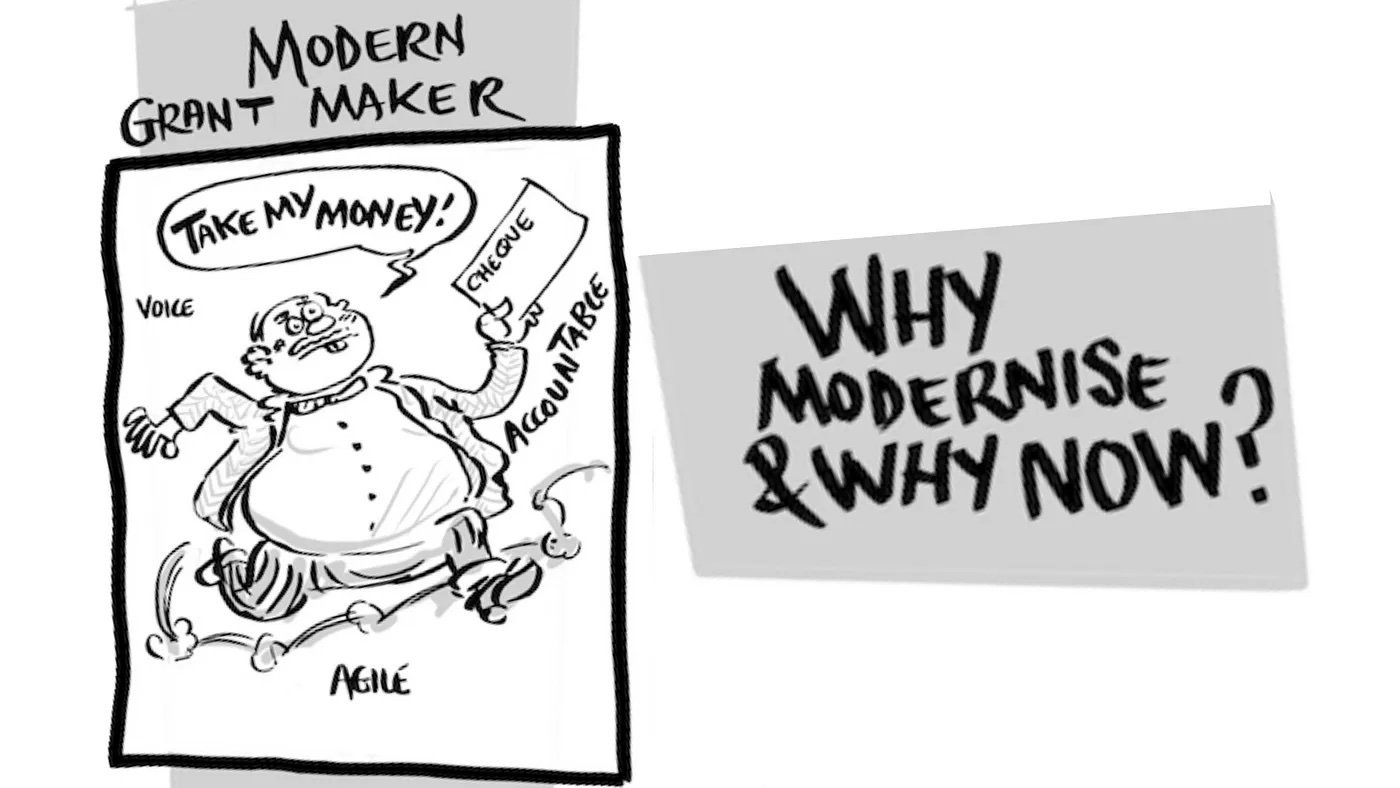How do we speak about modern grant-making?
Behind the Editorial Curtain of Alliance Magazine

Last week, I had the pleasure of attending Alliance magazine’s first in-person event of the year to celebrate its 100th issue and 25 years in philanthropy. I must say, after all these months attending online webinars, I felt absolutely inspired by all the real-life, stimulating conversations I had with colleagues in the sector.
My favourite part was the interactive workshop, where small groups were tasked with the design of a special feature of in-depth coverage on a current topic for Alliance. My group focussed on ‘modern’ grant-making — a topic we have been debating extensively both with our clients at I.G. Advisors and through our podcast, What Donors Want (of which Alliance is media partner). Modern-grant-making is essentially the practice of doing philanthropy in a new, non-traditional way, calling for more participation, trust and inclusivity, and fewer restrictions to grants.
Here are the modern themes and features we pitched for our special Alliance issue:
Participatory approaches
Practitioners in the space have been discussing this approach extensively, and several non-profits such as the With and For Girls Collective and the National Lottery are leading the way when it comes to shifting the power and ceding the decision-making to the individuals or communities impacted by the actual decisions that are being made. Whether through ‘full’ participation or not — grantees need to be consulted more, and more funders need to adapt their practices.
Featuring: An interview with a grantee about what it’s actually like to sit on a participatory panel (the good, the bad, and the ugly). Funders, listen up!
Funding agility
Covid-19 has shown the need for philanthropy to be able to react fast. Several funders responded promptly, issuing emergency grants, removing restrictions, reducing reporting requirements, and practicing what we call ‘trust-based philanthropy’. As grant-makers are learning about new, less complex ways of giving that grant more power and trust to grantees, we need more of them to follow the lead and keep up these practices in the post Covid-19 era.
Featuring: Funders’ written pledges to commit to more agile funding post Covid-19, explaining their ‘promise’ and how they will go about maintaining it.
Leading by serving
Philanthropy is not meant to lead, and grant-making shouldn’t be a one-direction stream that starts from the philanthropist’s personal values. The question ‘What do I want to do with my philanthropy?’ is essentially wrong, or rather, incomplete. Instead, funders should first interrogate themselves with a different question: ‘What does the world need from me?’ It is only once this question is answered that giving can be done effectively.
Accountability and transparency
You know the saying, with great power comes great responsibility … and our group argued accountability is just as important, particularly when it comes to Foundations. Boards need to change their practices and shift the power dynamics with grantees and staff to become more inclusive and diverse. Increasing transparency about how decisions are made can help deepen public understanding and call for greater collaboration and inclusivity.
Featuring: The ‘behind the scenes’ of a Funder’s internal meeting, as Programme Officers discuss why specific grantees are being selected for funding.
One thing I learned about being an editor is that it can be extremely hard to pick a limited number of themes for a special feature, especially when there are so many incredible, fresh, and modern approaches to philanthropy out there.
The good news is…this conversation doesn’t have to end here: I.G. is hosting another book-club event in October to discuss Modern Grantmaking, A Guide for Funders Who Believe Better Is Possible with authors Gemma Bull and Tom Steinbeck — we hope to see you there!
This article was originally published on Alliance.
As we close the chapter on 2024 and step into a new year, our Advisor, Harriette, finds herself reflecting on what’s needed to move philanthropy forward in 2025.
It’s not a groundbreaking revelation that staff wellbeing and burnout are huge challenges our sector is facing right now, and the sector-wide lack of investment in professional development has a lot to answer for.
Our Associate Advisor Charly makes the case that greater investment in your grantmaking team = greater impact for your organisation, and beyond.
While philanthropy and football may seem worlds apart, I’ve started thinking about the many similarities that can provide valuable lessons for those in the philanthropic sector. I for one, am always learning about the essential elements of football that can inspire and inform effective philanthropy.
Through the power of collective design, our fundraiser and grantmaker #FixTheFlow Fellows have imagined the future of our philanthropic funding system, and we should all listen carefully.
In the coming months, our Associate Carli is exploring the complexities of social innovation and will share her learnings, insights, and questions with you.
I.G.’s CEO Emily shares some of the mistakes and challenges she found during her leadership journey, and what she learned and will share in I.G.’s new Leadership Lab.
I’m expected to show up as a leader, but don’t feel like a leader. Introducing Impact & Grow: A Leadership Lab.
Leveraging Limited Funds For Humanitarians: Insights from the 2024 #HX24 conference, organised by Save the Children UK and the Humanitarian Leadership Academy.
Social enterprises have a particularly interesting relationship with Monitoring, Evaluation and Learning (MEL) as they need to capture both the financial and social/ environmental impact of their work, and speak to a wide range of potential funders and investors. Caitlin McLoughlin chatted to Abhinav Khanal, Co-Founder and Executive Director of Bean Voyage, to explore this further.
Image Credit: Bean Voyage
A round up of everything the I.G. team did in 2023!
Introducing a new, dedicated funders stream to I.G.’s #FixTheFlow Fellowship! We’re accepting applications until 17th November (for a 2024 start). Join our movement at fixtheflow.org
Join us for one (or all!) our eight workshops in our Autumn Training Series, where we will cover some of the trickiest topics facing fundraisers today.
What does meaningful and effective learning actually mean in practice?
Our Advisor Caitlin interviews Kore Global’s Emily Boost on learning how to learn and all things feminist evaluation and learning.
How do we balance our passion and our desire to give our best, whilst not being consumed by failure to live up to our own or others’ expectations?
At I.G. Advisors (I.G.), we’re often approached to design and implement evaluations for our clients to understand the impact of their grantmaking, fundraising or programmatic strategies, and identify opportunities for evolution.
The ‘lone saviour’ approach won’t cut it (and it also might destroy you).
It’s hard to believe it now that we’re living through a polycrisis, but the financial crisis and Great Recession of the 00s felt like a once-in-a-lifetime jolt to the world order at the time.
What you can learn from others leading philanthropic networks like yours
‘Well, we could have called that one.’
I.G. Advisors (I.G.) recently had the pleasure of collaborating with The Big Give and Rosa on the Women and Girls Match Fund.
Being a parent is often a thankless task. You take something and nurture it, treating it with love and care, losing sleep and worrying if — against all odds — , it will achieve its full potential and become the best it can be. It may never, ever show gratitude for your sacrifice. And then one day it will grow up and leave.
New I.G. Insights report explores how fundraisers and funders can support digital fundraising for racial justice issues.
#TaxPhilanthropy — wealth holders have the power to pay more tax right now even if governments fail to reform their policies
How starting small might be the most effective way to change the world.
An insight into “Modern Grantmaking: A Guide for Funders Who Believe Better is Possible”
A couple of weeks ago, I.G. brought back its much-loved book club event for our first in-person get together in over a year.






























